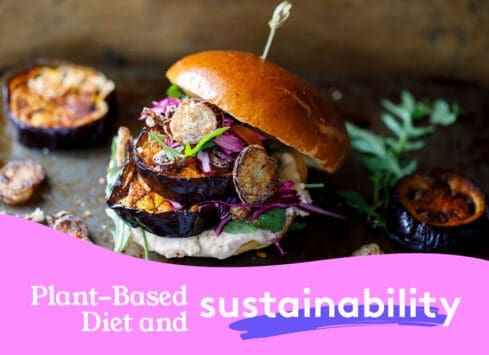Plant-Based Diet & Sustainability
By: Sheetal Parikh, MS, RDN, LDN, Lead Dietitian-Region Support, Clinical and Patient Services and Dorothy Clarke, MBA, MA, RD, LD, Regional Vice President


Sustainability is defined as the “avoidance of the depletion of natural resources in order to maintain an ecological balance.” Today, sustainability is a global focus as the ecological balance is increasingly affected by the overconsumption of natural resources.
In 2010, the Academy of Nutrition and Dietetics (AND), American Nurses Association, American Planning Association, and American Public Health Association met to develop a set of shared food system principles to support socially, economically, and ecologically sustainable food systems that promote the health of the humans and the planet. Sustainability means meeting our own needs without compromising the ability of future generations to meet their needs. The food we consume has a direct impact on the ecological system.
Did you know that incorporating a plant-based diet can support environmental sustainability?
A study of industrial farm animals in the United States concluded, “the present system of producing food animals in the U.S. is not sustainable and presents an unacceptable level of risk to public health and of damage to the environment” as mentioned by AND’s Vegetarian Nutrition Dietetic Practice Group (VNDPG) RD resource. By following a plant-based diet, we can help reduce resource consumption, environmental degradation, and greenhouse gas emissions.
Compass Group was a founding member of Menus of Change, which incorporates plant-based foods into the menu. This groundbreaking initiative, launched in 2012 by The Culinary Institute of America and Harvard T.H. Chan School of Public Health works to realize a long-term, practical vision integrating optimal nutrition, environmental stewardship, and social responsibility concerns within the foodservice industry and culinary professions. In addition to Menus of Change, Morrison Healthcare promotes the incorporation of plant-based meals through plant-based menus, plant forward retail concepts, sustainable purchasing, and customer education and engagement. In addition, we also promote through initiatives like Waste Not 2.0, Sustainability, Well Power, and Teaching Kitchens.
Ways to Incorporate Plant-based Meals into your Diet:
According to Barilla’s Center of Food and Nutrition, reducing consumption of animal proteins to twice a week can reduce CO2 equivalent emissions by as much as 2,300g per day compared to bringing meat to the table every day. If this impact is multiplied by a community, on a large scale, this would contribute a significant benefit to the environment. Practicing sustainability through a focus on plant-based meals not only supports our health but the environment.
- Make a gradual change to plant-based foods in your diet. Instead of expecting drastic changes, slowly incorporate more plant-based foods into your diet. For example, instead of ordering or preparing a Chicken Caesar Salad, swap chicken with your favorite legume and keep the cheese. Once you become used to this combination, swap the cheese for nuts and avocados.
- Invest in a plant-based recipe book, and do not be afraid to experiment with new foods and recipes. In addition to the plethora of plant-based cookbooks available, the internet has many plant-based meals resources via food blogs. Find recipes that incorporate your preferences or enjoy different tastes and cuisines.
- Stock your pantry with whole plant-based foods options. Chances are, if your pantry is stocked with the sustainable foods you prefer to eat, you will continue to make healthy choices. Take time every week to go shopping, involve family if applicable.
- Involve your family and friends around you. Invite family and friends for plant-based meals.
- Encourage prevention of food waste and learn how to grow organic produce in the backyard. Growing a garden and composting food is a win-win for the environment and supports sustainability efforts.
- Create awareness with patients, the community, colleagues, legislators, policy councils, and public health organizations:
-
-
- World Water Day – March 22nd
- National Nutrition Month – March of every year
- Earth Day – April 22nd
- Stop Food Waste Day – yearly on the last Wednesday in April
-

